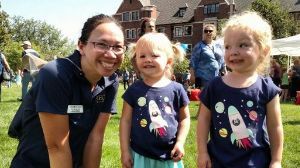Quyen Hart

Assistant Professor
Physics and Astronomy
Regis University, Denver
How did the Ambassador Program help you?
As the only astronomer at my institution, I knew that I would be the only person involved in astronomy outreach. The Ambassadors program introduced me to the best practices when engaging in informal science education with the general public, gave me astronomy activities to use at outreach events, and allowed me to connect with other astronomers who are also passionate about outreach. The training gave me more confidence in organizing larger and larger outreach events at my home institution.
Why do you do this work?
I have always been passionate about astronomy and teaching. I teach astronomy and physics at the university level, but I am also involved in astronomy outreach to the general public. Astronomy outreach gives me the opportunity to share my enthusiasm for astronomy with others and to encourage people to learn about the process of science in astronomical discoveries. I believe that educating everyone about astronomy will help keep future generations of people interested in astronomy and I think the same is true about any science field. I believe this so whole-heartedly, that I collaborate with my university colleagues to host an annual science open house, run by university students. We invite the community to a three hour event where they can engage in over 24 hands-on STEM activities, including astronomy-related activities.
Share an outreach event you are most proud of.
In August 2017, the path of totality was within driving distance of Denver, Colorado. For personal reasons, I knew that I couldn’t drive up to Wyoming to see totality. So, I did the next best thing – I held a partial solar eclipse watch party at my university. As the only astronomer on campus, I knew that I needed to coordinate everything, figure out the logistics, and get the general public to campus. In the weeks leading up to the event, I reached out to everyone I knew who would be in town and asked them to volunteer. Thirty people helped me this event, which included passing out 1000 free solar eclipse glasses, working four telescopes with solar filters, two telescopes using solar projections, and hosting many hands-on activity stations. We had tents set up, music playing across the university, and news crews arriving to document the eclipse frenzy. At one moment, just near the eclipse maximum in Denver (nearly 92% eclipse), I turned and looked at the crowd. People were everywhere and we estimate that 2000 people came to my eclipse watch party. It was an amazing experience and the best astronomy outreach event that I have hosted to date. I don’t think that I could have hosted such a successful event without the support and training that I received as part of the Ambassadors program.
